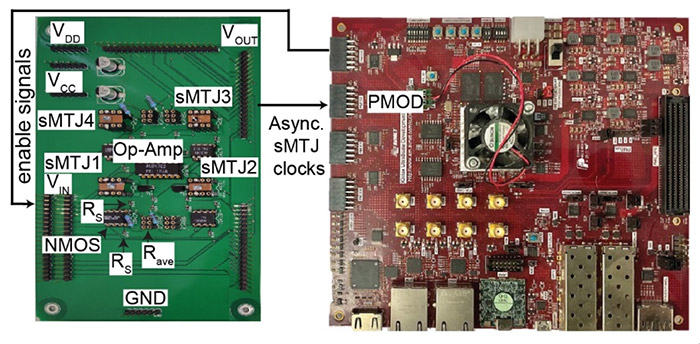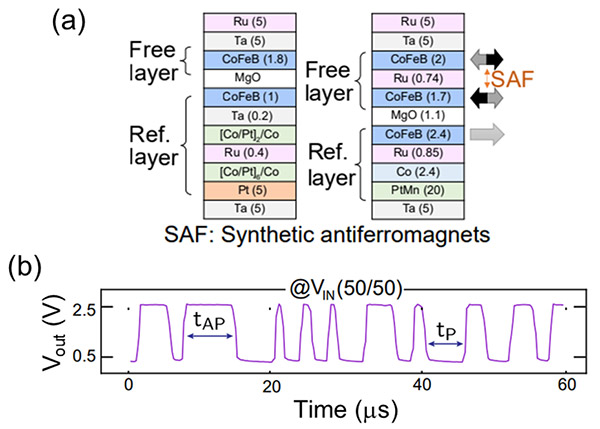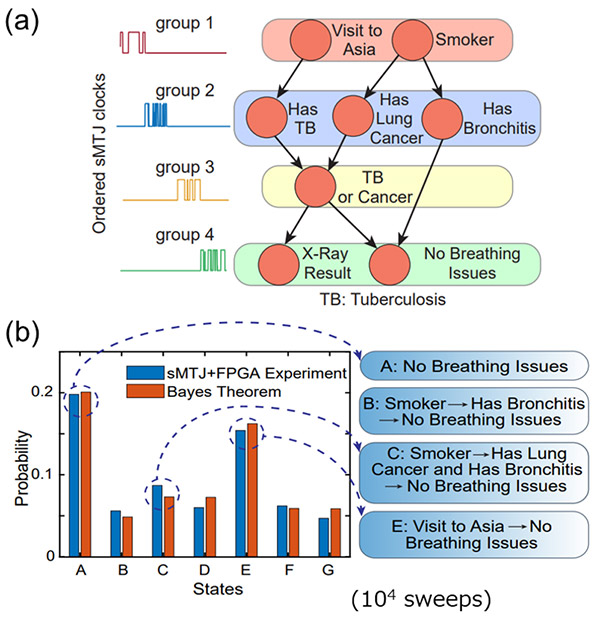

Researchers at Tohoku University and the University of California, Santa Barbara have shown a proof-of-concept of energy-efficient computer compatible with current AI. It utilizes a stochastic behavior of nanoscale spintronics devices and is particularly suitable for probabilistic computation problems such as inference and sampling.

A photograph of the proof-of-concept of the spintronic probabilistic computer consisting of sMTJ-based p-bit unit (left side) and Field-Programmable Gate Array (FPGA) (right side). © Shunsuke Fukami, Kerem Camsari et al.
They presented the results at the IEEE International Electron Devices Meeting (IEDM 2023) on December 12, 2023.
With the slowing down of Moore’s Law, there has been an increasing demand for domain-specific hardware. Probabilistic computer with naturally stochastic building blocks (probabilistic bits, or p-bits) is a representative example owing to its potential capability to efficiently address various computationally hard tasks in machine learning (ML) and artificial intelligence (AI). Just as quantum computers are a natural fit for inherently quantum problems, room-temperature probabilistic computers are suitable for intrinsically probabilistic algorithms, which are widely used for training machines and computational hard problems in optimization, sampling, etc.
Recently, researchers from Tohoku University and the University of California Santa Barbara have shown that robust and fully asynchronous (clockless) probabilistic computers can be efficiently realized at scale using a probabilistic spintronic device called stochastic magnetic tunnel junction (sMTJ) interfaced with powerful Field Programmable Gate Arrays (FPGA).
Until now, however, sMTJ-based probabilistic computers have been only capable of implementing recurrent neural network, and developing the scheme to implement feedforward neural networks have been awaited. “As the feedforward neural networks underpin most modern AI applications, augmenting probabilistic computers toward this direction should be a pivotal step to hit the market and enhance the computational capabilities of AI” said Prof. Kerem Camsari, the Principal Investigator at the University of California, Santa Barbara.
In the recent breakthrough to be presented at the IEDM 2023, the researchers have made two important state-of-the-art advances. First, leveraging earlier works by the Tohoku University team on stochastic magnetic tunnel junctions at the device level, they have demonstrated the fastest p-bits at the circuit level by using in-plane sMTJs, fluctuating every ~microsecond or so, about three orders of magnitude faster than the previous reports. Second, by enforcing an update order at the computing hardware level and leveraging layer-by-layer parallelism, they have demonstrated the basic operation of the Bayesian network as an example of feedforward stochastic neural networks

(a) Stack structure used in previous (left) and present (right) works. (b) Measured output signal of the p-bit showing microsecond random telegraph noise. © Shunsuke Fukami, Kerem Camsari et al.
“Current demonstrations are small-scale, however, these designs can be scaled up by making use of CMOS-compatible Magnetic RAM (MRAM) technology, enabling significant advances in machine learning applications while also unlocking the potential for efficient hardware realization of deep/convolutional neural networks”, said Professor Shunsuke Fukami, the Principal Investigator at Tohoku University.

(a) Output signal from the sMTJ-based p-bit enforced to perform Bayesian network. The Asia network, a textbook example of the Bayesian network is tested. (b) Experimental results of the operation © Shunsuke Fukami, Kerem Camsari et al.
| Title: | Hardware Demonstration of Feedforward Stochastic Neural Networks with Fast MTJ-based p-bits |
|---|---|
| Authors: | Nihal Sanjay Singh, Shaila Niazi, Shuvro Chowdhury, Kemal Selcuk, Haruna Kaneko, Keito Kobayashi, Shun Kanai, Hideo Ohno, Shunsuke Fukami and Kerem Y. Camsari |
| Conference: | 69th Annual IEEE International Electron Devices Meeting (IEDM 2023) |
Shunsuke Fukami
Research Institute of Electrical Communication
| E-mail: | s-fukami@tohoku.ac.jp |
|---|---|
| Webstie: | Fukami Laboratory |